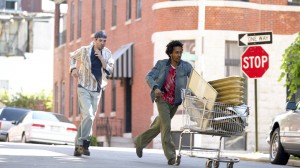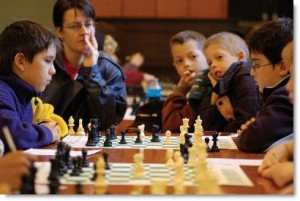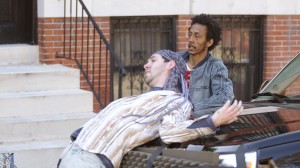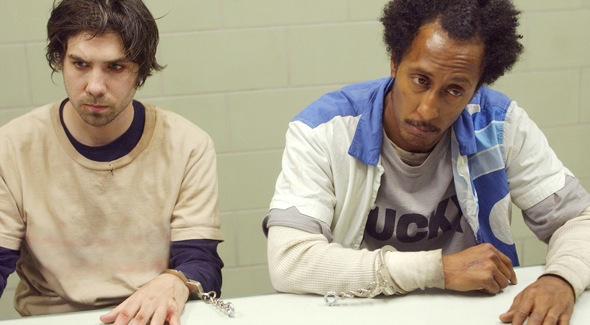[Hey all! Enjoy this post on that old chestnut, The Wire, from guest author Rob Goodman! – Ed.]
Confined to a wheelchair, sporting a colostomy bag, newly diagnosed with HIV: this is Johnny, a heroin addict. He’s recuperating from the savage beating that nearly killed him, but today he’s feeling well enough for a visit from Bubbles, his partner in addiction. Stunned as he is to find that he’s carrying “the bug,” Johnny won’t accept any sympathy. Instead, he promises his friend that, as soon as he’s checked out of the clinic, he’s ready to get back to the work of scoring dope. Bubbles can’t hide his grudging admiration: “Beat down, bagged up, still ready to rip and run, huh?”
Johnny enthusiastically agrees: “I’m a Viking, homes!”
The Wire has gotten no end of praise as the most morally complex TV show to ever air. But this scene between Bubbles and Johnny—and indeed, their treatment throughout The Wire’s first season—deserves special attention, more than it’s gotten, because it gets at the heart of the show’s sophisticated thinking about what it means to be a good person, about what virtue means in a morally compromised world.

Johnny’s reaction must sound delusional to a non-addict: having just received an impossibly powerful demonstration of the cost of addiction, it’s proof that he hasn’t learned a thing. Yet here is a man reduced to a point lower than anything I can imagine surviving, and he’s still proud of the fact that he’s going to shake off disaster and get back to the only thing that he considers work. This is real, honest-to-goodness courage. This is the stuff of inspirational posters and motivational speeches.
This is courage in the service of an awful, idiotic cause—an addict ruining his life with drugs—but it still looks like courage to me. Most Wire devotees can name the moment when it dawned on them that this was more than another cop show, and this was mine: the moment when I realized that a man can be proud of being a resilient heroin addict, and actually have a point. It’s Johnny’s evident pride that makes clear to me that this is about more than jonesing for a hit: this is about virtue in the life that he’s chosen.
Bubbles and Johnny drive The Wire’s investigation of a moral paradox: is a virtue used in a bad cause still admirable? Is it still a virtue? How is an addict’s courage different from a cop’s courage—or is there no difference at all? Questions like these matter well beyond Baltimore’s drug world.
Six days after 9/11, for instance, Bill Maher angrily dissented from President Bush’s claim that al-Qaeda terrorists were “cowards”: “Staying in the airplane when it hits the building—say what you want about it, not cowardly.” His words were met with public outrage and a rather ominous insistence from the White House that Americans should “watch what they say.” Maher and his defenders responded that he hadn’t endorsed terrorism, that courage is a “morally neutral virtue”—but their arguments couldn’t save his suddenly radioactive network show. Not long after, it was cancelled.
Knowingly or not, Bubbles and Bill Maher were both tangling with some of the most important issues in virtue ethics, a tradition dating back to Aristotle, which examines actions not in terms of rules, duties, or outcomes, but in terms of character. And these are just the issues examined by one of the most influential living philosophers, the ethicist Alasdair MacIntyre, in his landmark book After Virtue.
MacIntyre’s insight is that in order to think about virtues, we have to think about communities. Virtue doesn’t make sense in isolation: we need communities to develop shared ideas of admirable character, to set and pass on enduring standards of conduct, and to provide the arena for the activities in which the virtues enable us to excel. “The exercise of a virtue,” writes MacIntyre, “exhibits qualities which are required for sustaining a social role and for exhibiting excellence in some well-marked area of social practice.”
For MacIntyre, “practice” is a technical term. It is any kind of complex, communal activity with its own standards of excellence: “to enter into a practice is to accept the authority of those standards and the inadequacy of my own performance as judged by them.” A practice is the kind of activity we pursue not only for the rewards it offers (such as money or fame, which MacIntyre calls “external goods”), but for its own sake (or for its “internal goods”). MacIntyre demonstrates the difference with the example of a child playing chess in return for a piece of candy every time he wins. As long as the child is only in it for the candy, there’s no reason why he won’t cheat to win, provided that he can get away with it. Yet in the process, if the child comes to value for their own sake the imagination and strategic thinking that the game requires, he’s on the way to practicing chess for its internal goods.

But internal goods only make sense to experienced practitioners (in the sense that I can’t criticize your chess strategy without knowing what the pieces do). So to enter into a practice—whether it’s chess or football or politics or raising a family—is to enter into a community, with a willingness to learn from it. And in this process of growing excellence, it becomes clear that we can only achieve the goods internal to a practice by demonstrating those character traits we know as the virtues. For instance, “we have to learn to recognize what is due to whom; we have to be prepared to take whatever self-endangering risks are demanded along the way; and we have to listen carefully to what we are told about our own inadequacies.” Not coincidentally, these happen to be the virtues of justice, courage, and truthfulness.
MacIntyre’s point is not that all gifted chess players or musicians are good people, or even that virtues require practices—it is that there is a moral dimension to excelling at an activity for its own sake. To love chess and excel at it, it’s not enough to be merely smart. You also have to be, at least when it comes to learning from a community and growing in a practice, virtuous.
Back to The Wire: to understand whether Bubbles and Johnny are displaying real virtue, it would help to know if they are engaged in a practice as MacIntyre defines it. Does “heroin addiction” or “scoring dope,” broadly understood, count as a genuine practice?
The intuitive answer would seem to be: “Are you high?”
To the cops who often ignore them, and especially to the dealers who brutalize and exploit them, Bubbles and Johnny are “just dope fiends,” the lowest of the low. To be “just a dope fiend” is to be an atomized individual, stripped of all goods but one, dedicated to nothing beyond the next high. A dope fiend is not just weak, but contemptible.
What’s remarkable about The Wire, though, is how deliberately it undermines this point of view. It portrays its addicts as members of makeshift communities—surely communities that come together for reasons of unromantic necessity, but ones nonetheless marked by strong ties of loyalty. As a useful contrast to The Wire’s addicts, who are driven together by their shared addiction, we might consider the heroin addicts of the far more moralizing Requiem for a Dream: its addicts are driven apart by their mounting selfishness and their mounting dedication to the high at the expense of all else.
It would be silly to claim that Bubbles and Johnny aren’t also driven by a destructive dedication to drug use: after all, their addiction has put them on the street. Still, The Wire is at pains to show us that they value the practice of scoring drugs not only for the sake of the next high, but because they’ve come to value some aspects of the addict’s life for its own sake. In MacIntyre’s terms, Bubbles and Johnny recognize that the addict’s life consists of internal goods as well as external goods, and they are both willing to develop those internal goods through the application of the virtues.

The Wire’s addicts share more than needles: they share a culture with its own code of conduct, tricks of the trade, and insider expertise. Bubbles, as the more experienced user of the two, repeatedly takes great pride in “schooling” Johnny. In fact, he treats Johnny’s street education as something of a responsibility and is willing to break down Johnny’s unjustified self-confidence in the process: “I’m trying to give you a little game, man, but you want to pretend like you know something.” When Johnny answers that he has “game” already, Bubbles replies: “Naw, naw, you green. I’m trying to get you brown, man, but you still green.” Thereafter, Johnny takes pride in pointing out his increasing “brownness.” For Johnny, who’s white, there are more than a few racial overtones here. But there’s more to it than that: as MacIntyre points out, acknowledging our own inexperience, and putting ourselves at the feet of those further along in a practice than we are, is a beginning of virtue.
And that goes for all of us, not just beginners. Bubbles is willing to teach, but he’s also willing to learn: there are few peoples Bubbles finds more credible than Walon, a recovering heroin addict (played by recovering heroin addict Steve Earle) and Narcotics Anonymous leader. It’s clear that he earns Bubbles’s respect not simply because he’s clean, but because he can speak from an experience in the addict’s life that outpaces even Bubbles’s own.
The Wire would not be a convincing depiction of an addict’s virtue if the only moments of value it allowed Bubbles and Johnny were a few fleeting hours of heroin in their blood. But those moments are rarely depicted; the series spends far more time watching them place value on the perseverance of their life in the street, their ingenuity in eking out a living, and, yes, Johnny’s courage in reacting to his HIV diagnosis. In the broader plot of the series, these moments are all peripheral — but to The Wire’s moral worldview, they are absolutely central.
None of this means that a virtue ethicist would endorse a life of heroin addiction: MacIntyre insists that “it is certainly not the case that … whatever flows from a virtue is right.” And none of this means that The Wire glamorizes drug use: that’s an impossible claim to make about a show that dwells on every one of Bubbles’s track marks and drug-broken relationships, and on the squalor of the life he’s made for himself. So why does The Wire’s recognition of the addict’s virtues matter at all?
Because, rather than writing off its addict characters as hopeless, inhuman, or evil, it shows how Bubbles is ultimately drawn out of addiction by the virtues he already has. Walon, his eventual NA sponsor, appeals to Bubbles because he can speak so honestly about the values of the addict’s life — because he, too, is “schooled” in addict culture and in many ways still a part of it. And in the series’s final season, Bubbles is finally shocked out of addiction by the death of a drug-addict friend (Johnny’s successor as his street apprentice). On the street, the virtue of loyalty makes Bubbles’s life bearable. In the end, the same virtue — loyalty to his friend’s memory — wins out over his addiction. In other words, he finds, at great cost, that the same virtues he learned to value in the addict’s life can be lived out more fully in a clean life.
That’s as nuanced and as convincing a portrayal of moral progress as I’ve ever seen in fiction. As MacIntyre puts it: “There is no inconsistency in appealing to the requirements of a virtue to criticize a practice.” And as a clean Bubbles puts it at the end, explaining the day he stopped using: “I didn’t get high. I knew, if I did, I wouldn’t get that good feeling back.”
Rob Goodman is the co-author of a book on Cato and the Roman Republic, due out in 2012. He’s written for sites including The Atlantic, The Chronicle of Higher Education, and Guernica.

[Is excellence its own reward? Does excelling in one field, like selling baggy white T-shirts, lead to improvement in other fields? Sound off in the comments! – Ed.]
I’ll take Socrates over Aristotle: all virtues converge. Virtue in the wrong cause may not be virtue at all; it may simply be well-meaning, which obviously isn’t quite the same thing.
Even Johnny’s “courage” is really cowardice, because it represents the choice between something that is easier and worse (continuing to score heroin) and something that is harder and better (kicking the habit, or at least trying to). The fact that both are outrageously hard does not change the fact that he is picking the less difficult, and less courageous, of the two options. His courage may stack up well compared to everyday actions, but it is the less courageous option of the two currently in front of him.
I don’t know if your deontological approach (i.e., pursuant to the rule “on balance, one ought choose the action most likely to increase one’s lifespan,” or something similar) is the most conducive to such a morally complex situation, Chris. Insofar as Johnny will likely never advance socially beyond Baltimore’s streets, is it not relatively valuable that he embraces and contributes to the addict community? Or, to put it differently, should we judge the self-harming-but-community-embracing actions of an individual negatively when, regardless of even an extreme application of the Protestant work ethic, he has virtually no possibility of achieving the American dream?
Thanks for the reply. :)
I think a deontological approach is necessary when discussing something like courage. The case you’re making is that he may be making the best overall decision given his circumstances, but that’s not the same thing as defending the idea that his decision is a courageous one. I guess I’m open to whether or not the deontological approach is the best one for the entirety of the article, but I was only applying it to that one claim.
That said, I don’t think I’d grant the premise that he has no chance to advance beyond the streets, anyway. I don’t know if he can achieve the “American dream,” but most people don’t feel the fallback for failing to do so is heroin addiction. There are plenty of gradations and degradations inbetween, and in The Wire‘s universe a person like Johnny does have the potential to possibly live a better life, if not a fantastic one. For evidence of this, you need look no further than the ultimate fate of his (literal) partner-in-crime, Bubs.
How would you respond to the many ways in which the “Free-Zone” allows Bubbles and Johnny to drift apart? Its influence on the culture of heroin poaching is undeniably game-changing and really does seem to offend Bubbles. Does the Free-Zone eliminate virtue by socializing external-goods?
I like the provocative idea of your post, but I just can’t agree with your conclusion. Because if you grant Bubbles and Johnny their virtue, how can you deny it to the real criminals like the Barksdales and Stringer Bell? Aren’t they trying to be virtuous within their own drugdealing and murdering community? Robber and stick-up man Omar exemplifies this line of reasoning: “A man’s gotta have a code.” In this teleological universe even McNulty’s actions in the last season might be considered good and virtuous.
I think The Wire shows that in a world without moral absolutes people cling to any virtue they can find as a strategy to secure the one thing they can’t live without: dignity. The triumph of the show is that it grants every character, from the highest official to the lowest drug fiend, their basic human dignity. In that sense it is a strong plea for the categorical imperative, however hard it is to live up to in the real world.
What you saw from Johnny was not courage, it was ignorance. I’ve known scores of Johnny’s over the years, many of them addicts. Like every other segment of society, there are smart ones and dumb ones. Johnny falls in the latter category. The reality is that Johnny is oblivious to recognize how dire his circumstances really are, so it requires no courage to keep moving on.
On a conscious level he understands and could tell you where the lifestyle has led him: unemployed, homeless, addicted, HIV positive, etc. But his mindset is such that he might as well be describing someone else.